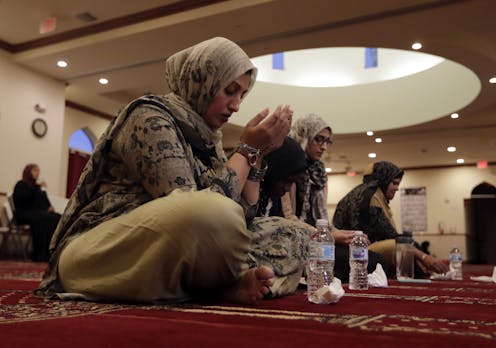So, what really is jihad?
- Written by Mohammad Hassan Khalil, Associate Professor of Religious Studies and Director of the Muslim Studies Program, Michigan State University

Often, many people conflate the terms jihad and terrorism. This is in part because many writers use the term “jihadist”[1] when describing violent Muslim radicals.
To be sure, such radicals have invoked jihad to justify their heinous acts, such as the 9/11 attacks[2] on the World Trade Center and more recent Islamic State group (also known as ISIS) operations[3]. But these acts have been strongly condemned[4] by numerous Muslim clerics and scholars[5] on Islamic grounds.
And as I show in my own research[6], violent radicals who attempt to justify terrorism on religious grounds are often misrepresenting the scholarly sources they cite.
The Arabic term jihad literally means a “struggle” or “striving.” This term appears in the Quran in different contexts[7] and can include various forms of nonviolent struggles: for instance, the struggle to become a better person. This falls under the category of “jihad of the self,”[8] an important subject in Islamic devotional works[9].
In the specific context of Islamic law, however, jihad generally signifies an armed struggle[10] against outsiders.
Medieval scholars of Islamic law delineated two basic forms of armed jihad: defensive jihad, an armed struggle against invaders; and aggressive jihad, a preemptive or offensive attack[11] commissioned by a political authority.
Not surprisingly, Muslim scholars have long debated[12] when exactly warfare can be justified[13].
Much less controversial, however, is the general rule that various categories of civilians must not be targeted[14].
This rule of civilian immunity is so widely accepted that it is even typically recognized by violent Muslim radicals[15]. But such radicals also invoke loopholes to get around this rule. When attempting to justify 9/11, for instance, Osama bin Laden argued, among other things, that American civilians could be targeted since, he asserted, American forces had previously targeted Muslim civilians[16].
To justify this loophole, bin Laden invoked the writings of medieval Muslim scholars such as al-Qurtubi. As I show in a recent book[17], however, al-Qurtubi actually held the exact opposite view: Civilians should never be targeted as a form of retribution.
This is but one example of why it is critical not to conflate the prevailing interpretations of jihad with Muslim terrorism.
[ Expertise in your inbox. Sign up for The Conversation’s newsletter and get a digest of academic takes on today’s news, every day.[18] ]
References
- ^ use the term “jihadist” (www.brookings.edu)
- ^ the 9/11 attacks (www.versobooks.com)
- ^ Islamic State group (also known as ISIS) operations (news.siteintelgroup.com)
- ^ strongly condemned (kurzman.unc.edu)
- ^ Muslim clerics and scholars (www.lettertobaghdadi.com)
- ^ own research (www.cambridge.org)
- ^ different contexts (www.oxfordscholarship.com)
- ^ “jihad of the self,” (www.al-islam.org)
- ^ Islamic devotional works (muslimmatters.org)
- ^ armed struggle (www.palgrave.com)
- ^ offensive attack (classes.stanford.edu)
- ^ long debated (classes.stanford.edu)
- ^ warfare can be justified (www.palgrave.com)
- ^ must not be targeted (www.warda.info)
- ^ violent Muslim radicals (www.cambridge.org)
- ^ targeted Muslim civilians (www.versobooks.com)
- ^ recent book (www.cambridge.org)
- ^ Expertise in your inbox. Sign up for The Conversation’s newsletter and get a digest of academic takes on today’s news, every day. (theconversation.com)
Authors: Mohammad Hassan Khalil, Associate Professor of Religious Studies and Director of the Muslim Studies Program, Michigan State University
Read more http://theconversation.com/so-what-really-is-jihad-118660

